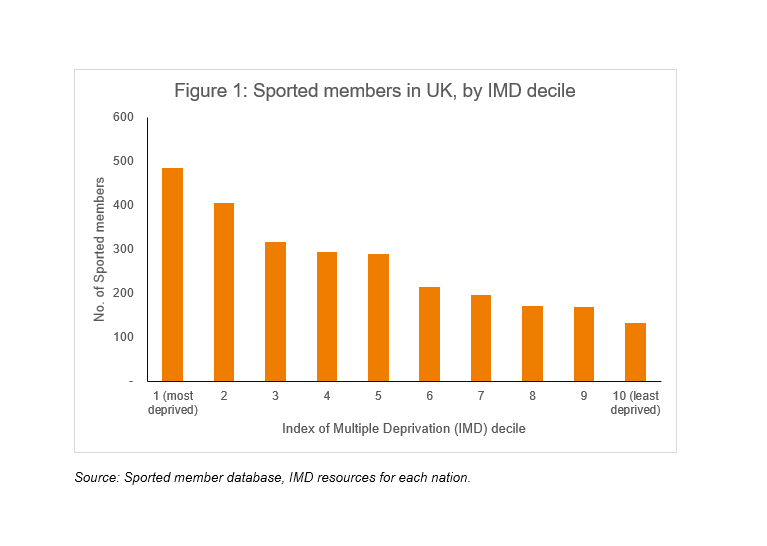The uneven distribution of charities
By Rose Chilton, Insight Manager Sported | 26th February 2020
By Rose Chilton, Insight Manager Sported | 26th February 2020
New Philanthropy Capital (NPC) recently highlighted the uneven distribution of charities in England; specifically, more affluent regions are better served by charities than less affluent regions: https://www.thinknpc.org/resource-hub/where-are-englands-charities. NPC report that on average there are 1.8 charities per 1,000 people in England. These are far from evenly distributed and are concentrated away from where they are most needed.
In Blackpool, the most deprived area, there are only 0.6 charities per 1,000 people, however in some more affluent areas such as the Cotswolds (2019 Index of Multiple Deprivation rank 272) it is as high as 5.5.
In South Northamptonshire (2019 Index of Multiple Deprivation rank 312—the sixth least deprived local authority district in the country) there are 3.2, five times higher than the rate in Blackpool, the most deprived.
Scottish Council for Voluntary Organisations (SCVO) also found fewer charities are located in the most deprived areas (quintiles 1 and 2) than on those with less deprivation: https://scvo.org.uk/policy/sector-stats.
Charities in deprived areas face bigger challenges. Both reports point to reduced capacity in ‘left behind’ areas:
• Fewer other charities to ‘share the load’
• Less formal volunteering
• Less available resource over a sustained period, including access to finance and specialist skills
In addition NPC highlight the following challenges:
• A bias in Gift Aid towards more prosperous regions
• Bigger cuts to local council spending
• Greater reduction in real income following the recession and austerity
We’re proud to say Sported’s membership (made up of charities, sports clubs and youth groups) bucks this trend.
Sported supports proportionately more groups in the most deprived areas (deprivation decile 1, 2 and 3) compared to affluent areas.
Across the UK, 33% of Sported members are in the bottom 20% areas of deprivation. In England this figure is 34%, in Scotland it is 28%.

Lorem ipsum dolor sit amet, consectetur adipiscing elit. Ut elit tellus, luctus nec ullamcorper mattis, pulvinar dapibus leo.
Lorem ipsum dolor sit amet, consectetur adipiscing elit. Ut elit tellus, luctus nec ullamcorper mattis, pulvinar dapibus leo.

Lorem ipsum dolor sit amet, consectetur adipiscing elit. Ut elit tellus, luctus nec ullamcorper mattis, pulvinar dapibus leo.
When compared to the national average, the South East (the most affluent region) is overserved by charities whereas the North East (the most deprived region) is underserved by charities. We do not see the same pattern in Sported members. In fact, Sported members are overserving the less affluent and ‘left behind’ North East region.
There are 10.2 Sported members per 100,000 people in the North East, compared to approx. 4.2 per 100,000 people across all regions, and only 2.6 in South East.
Since all charities in England have a much broader coverage than Sported members in England (2,086), the density scale used for Sported members is different by a factor of 100.

Figure 3 explores Sported’s membership distribution in even greater detail. It shows a general trend that as IMD rank increases (areas are more affluent) the density of Sported members decreases. This further illustrates how Sported members are supporting people in those typically ‘left behind’ and traditionally ‘hard to reach’ communities.
Amongst the 20 most deprived local authorities (which includes Blackpool) there are 5.1 Sported members per 100,000 population, whereas amongst the 20 most affluent local authorities (which includes South Northamptonshire) there are 1.9 Sported members per 100,000 population.
Local community organisations are often under-funded, under-resourced, and surviving on shoestring budgets and the tireless efforts of only a handful of dedicated local staff and volunteers. On top of this, NPC’s report has shone a light on the difficult circumstances in which they are operating. In a recent member survey of Sported members:
22% weren’t confident or weren’t sure they would still exist in 5 year’s time.
Only 4% felt very financially secure.
NPC consider various solutions, including government funding targeted specifically at deprived areas but they highlight the risk that this leads to one-off, time-limited, funding-driven entities which are not sustainable. They emphasize the importance of larger charities in supporting smaller organisations through shared resources and expertise, and that forms the basis of what we do.
We strive to build capacity rather than dependence. Sported provides FREE support in essential areas of organisational capacity, including business planning, financial planning, governance, fundraising and impact measurement etc. We specialise in making this support accessible to small, community organisations, ensuring they can survive in the long-term. The two reports referenced highlight why Sported members, operating in deprived areas, need this support more than ever.
Sported relies on the support of our volunteers, partners and donors to provide our services freely to member groups across the UK. If you’d like to talk to us about how you or your organisation can help us, please do get in via info@sported.org.uk / 0203 848 4670. Or find out more about Sported’s support here.
If you’d like to talk to us about how you or your organisation can help us, please get in touch, find out more about how you can get involved.